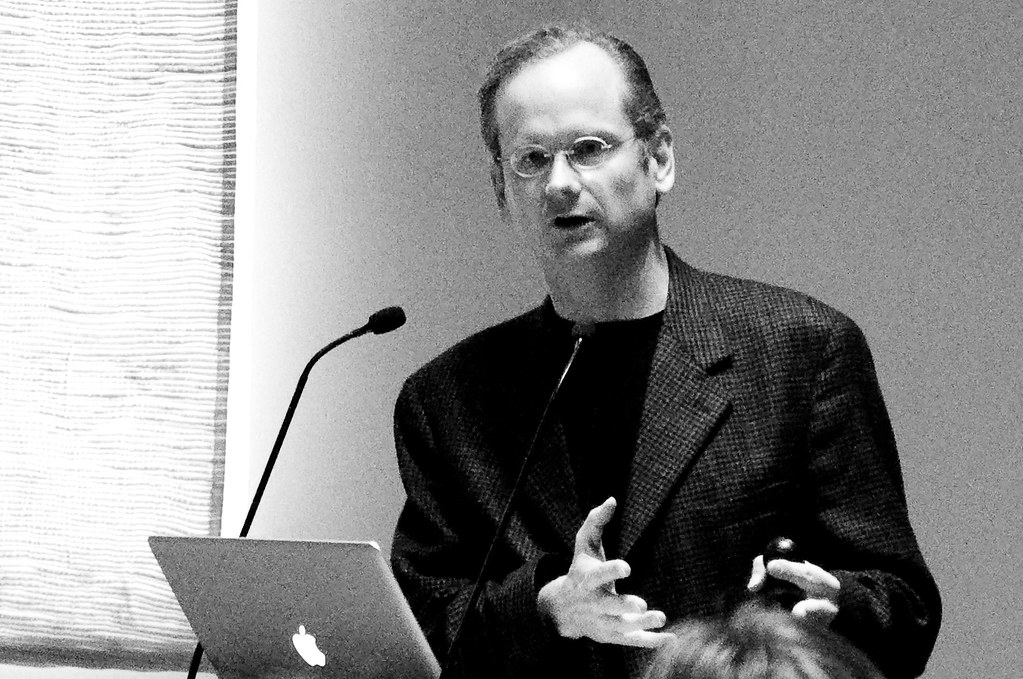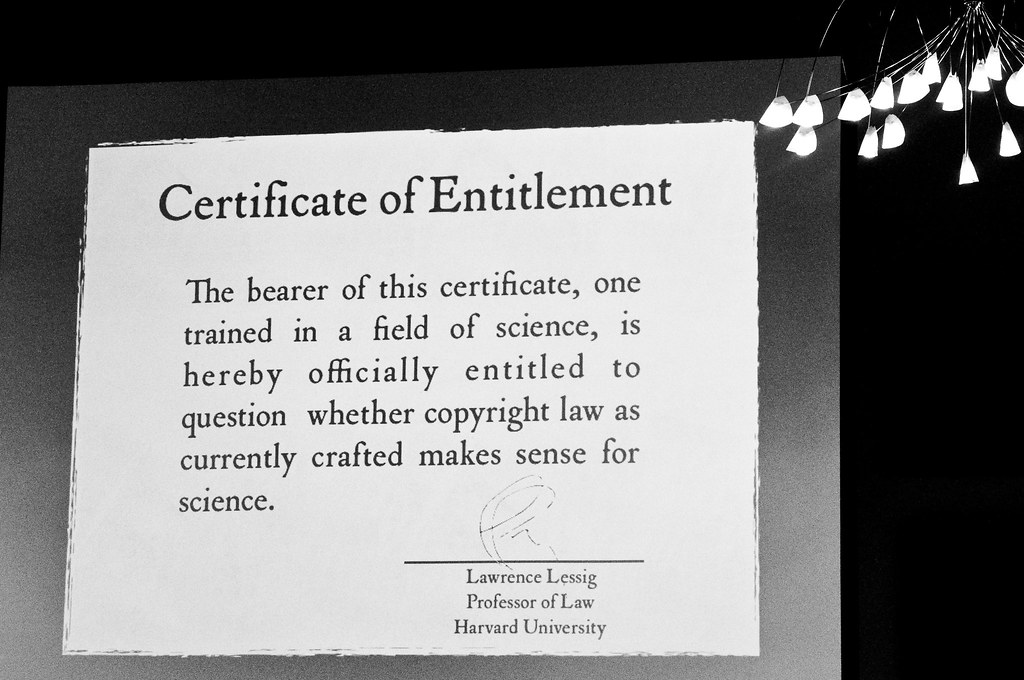On 9 January 2010 on the occasion of the honorary doctorate to be conferred upon Prof. Lawrence Lessig by the University of Amsterdam I attended Lessig’s keynote speech as part of the symposium on Open Content and Academic Publishing, Dutch Internet law expert Arnoud Engelfriet has an excellent blog post in Dutch in response to Lessig’s lecture and includes video. These are my notes from the lecture:
Observations on culture and copyright
According to Lessig copyright has little to do with the sphere of culture but the scope of copyright has changed drastically. It now touches everyone and everything and most of us cannot spend even an hour without colliding with copyright. This is because of the architecture of digital world where very few uses are copyright free. The digital architecture triggers the application of copyright. In the physical world, the reading of a book is unregulated. We allow free use of the book. Not fair use, but free use. We can even give the book away or sell it and it’s still a form of unregulated use. In the digital world this has changed as every single  use creates a copy. The platform by which we have access to copyrighted material such as books has changed. What does this mean for the media ecology
Professionals are people who depend on exclusive rights as part of their business model. They use copyright as a way to secure their business. The paradigm here is that if you don’t secure, you get less creativity. However, not all creators have the same business model. Copyright’s paradigm ignores these important cases that apply a different business model: amateur’s produce for the love, not for the money. This is critical for culture. The new ecology does not have exclusive rights but is building upon creativity within the ecology. The business model of this ecology is different.
There is a clash between the paradigm of copyright and the paradigm of creativity.
Two bits of culture
The ecology of books is one that preserves access well through library and used book shops. But when we compare it to the preservation of film there is something different going on. Film is often a compilation and its reuse is contingent of permissions of the rights holder. Documentaries contain snippets of other sources and it took Grace Guggenheim 20 years to clear the rights of her father’s legacy to transfer them to DVD. It seemed practically impossible to renew all the contracts of the snippets. Sadly, the vast majority of these films will disappear because nitrate film will dissolve before all rights are cleared.
What is different about these two bits of culture is the regime of rights under which books and films are created.
The ecology of creativity within science
What is the business model of science and what is its ethos? Science is about the common ownership of goods and entails a business model does that not build on exclusive rights. Lessig claims that the ecology of knowledge can actually be harmed by copyright. If the business model of science depends on sharing and building upon previous knowledge then how does the paradigm model of copyright help and where does it help? For example, academic journals violate the norm of science: to provide universal access to knowledge (Enlightenment ideal). Production costs made exclusive right ok in the past but these are now gone in the case of digital production and distribution. The open access movement aims to replicate the good in the process of peer review and access and avoid the evil in restrictions on access. An example is the Public Library of Science. Law has been oblivious to the ecology of creativity.
Ecology of access
Through the eyes of copyright there are three types of books:
- In copyright and in print (9%)
- In the public domain (16%)
- Presumptively under copyright, but no longer in print (75%)
The Google Books project decided to scan the books first and then ask for permission. Soon after the launch of the project Google was sued by the Association of American Publishers and the Authors’ Guild for “massive copyright infringement.” The first category of books didn’t pose a problem because publishers and authors may be contacted and asked for permission. The second category doesn’t require permission. But the third category is a different case because all these books are still under copyright but no longer in print and there is very likely no one to ask permission. If you would need permission before scanning it would mean that 75% of all the books would disappear. This case eventually led to the McGraw-Hill settlement:
So, this project launched and then the lawsuit filed against it was then purportedly settled by an agreement last October (slide: 10/28/08). The agreement says that basically 20% of all of the books in that little category would be available freely to people as they want across the Google Book Search Library. Freely in the sense that Google was going to pay for that right, but at least the user could get access to it for free. And then you would have the right to purchase the full book. And that money the user would pay for would then go into a pool that would be held by some new corporation that would give it out to those orphaned authors, assuming they could be found some day in the future. What this settlement left open, importantly, was whether what Google did originally should be considered Fair Use. Google, rightly in my view, insisted that their original plan was protcted by Fair Use, and they did not give up that claim in the settlement, but of course, the Authors’ Guild disagrees with that. So, whether it’s fair use to make this scan or snippets, so that was still held open, but now the project would now open 20% of these books up, and obviously 20% is more than snippets. (Lessig talk transcription by calmansi)
What is the ecology that this settlement produces? We currently have full free access in libraries, not a mere 20% access (20% is a simplification of the actual formula of access). The settlement produces a radically different library. This is not a digital library being built but a digital bookstore! We are an obsessive permission culture and those permissions are now down to the level of the quote (Google snippets). This causes the fear that this permission architecture will now cement. Does this make sense?
What to do?
Changing law is hopeless but we can change norms and practices: Creative Commons. This may also be applied to science in Science commons:
- Lower transaction costs of sharing, infrastructure to enable sharing. open access movement: 1000 journals
- Open data. CC0 = a waiver, not a license, of all the rights one might possibly claim. Technical information sharing: RDFa, semantic web
- Open materials. Scientists often deal with “stuff”. A Creative Commons infrastructure on the level of material, for example the personal genome project
We need to mark content with freedoms and make it human readable, lawyer readable and machine readable in RDF. Lessig calls for changing our norms and practices instead of trying to change the law.
More photos on Flickr licensed under an Attribution (Anne Helmond) – Noncommercial – No Derivative Works 2.0 Generic.



4 thoughts on “Lawrence Lessig in Amsterdam on Open Content and the Ethics of Science”